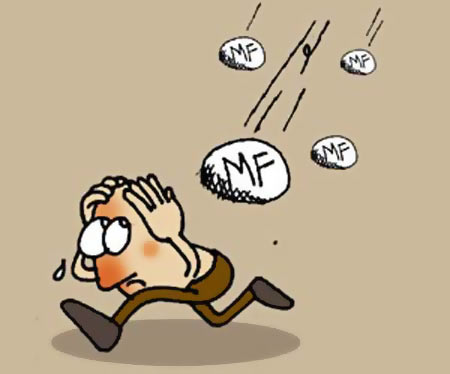Photographs: Dominic Xavier/Rediff.com Sameer Hassija
If you have ever invested in mutual funds, chances are that you would have narrowed down on one that put up some very good numbers in the recent past.
Despite the bold disclaimers about past performance not necessarily being sustained in the future, investors have a hard time resisting the data. Past performance is undoubtedly very luring, but should you rely on it?
The late Benjamin Graham, globally renowned value investor and author of Security Analysis and The Intelligent Investor, had an interesting view on this subject. He was of the opinion that past performance is useful in calculating the value of a mutual fund only so far as it is indicative of what is to come in the future. The key word being 'indicative'.
Think about it. A student who receives straight A's throughout his entire academic career isn't guaranteed to repeat this performance going forward. Having admitted that, it does give us some clue as to what one might expect in the future. In the same way, past performance plays a very important role in providing useful information in identifying future winners. However, it is absolutely no guarantee for future success.
Performance data is remarkably informative but its predictive power is limited.
How to look at past performance
When looking at past performance, pay a lot of attention to consistency. Don't get swayed by a sporadic burst in numbers. The fund should have put up a good performance on a consistent basis, rather than have a great run that immediately followed a dismal one. To get an accurate picture of a fund's consistency and its ability to perform under different market conditions, don't stick to the trailing returns. They could get skewed with a good one-year number. You must back up your analysis with annual returns.
For instance, a fund may be topping the charts with a great 10-year return that might cloak some dismal years along the way. Would you want to live with a fund that can plummet during a year and then climb the charts furiously later?
Look at how the fund did in 2007 and 2009 to see how it performed during market rallies and in periods such as 2008 to figure how if it got battered during a bear phase. If the fund holds up well on the downside, it would hint at conservatism.
On the other hand, it could be a perennial bull run winner that collapses during downturns.
When looking at returns, check to see how much it diverges from its peers and from its benchmark. All in all, this will give you a very realistic view of your fund's ability to maintain a good performance.
Looking beyond
In conclusion, past returns are undoubtedly useful in assessing the effectiveness of a fund manager or strategy, but they must be put in context. What risk did the fund manager take to achieve that return? Did s/he just get lucky with her/his top holdings? What do the pattern of returns say about her/his investment style? Can the numbers be reconciled with the fund's stated investment approach? How has the fund performed during sharp rallies and market downdrafts? How much has been the divergence of returns when compared with the benchmark and its peers?
Past performance has turned out to be the most common selection criteria and does play a confirmatory role in the fund selection process but is not a divining rod. Using it in isolation can be harmful. A good fund may experience years of bad returns due to its strategy.
Conversely, a not-so-impressive fund may have a good run. That is why in fund selection, there are numerous other factors that come into play when attempting to reach a holistic assessment.



Comment
article